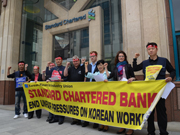News
UNI files OECD complaint over Standard Chartered performance pay plan

UNI Global Union and the Korean Finance Industry Union (KFIU) today filed a complaint with the OECD over UK-based Standard Chartered Plc’s effort to impose individual performance pay at its subsidiary in South Korea--which is not standard practice and will drive down standards in the industry.
The complaint says that by insisting on the individual performance pay scheme Standard Chartered is driving down standards in Korea in violation of the OECD Guidelines for Multinational Enterprises, which say companies must “[o]bserve standards of employment and industrial relations not less favourable than those observed by comparable employers in the host country.”
No other bank in South Korea has an individual performance pay scheme.
Standard Chartered has frozen wages in South Korea for the last four years but paid huge bonuses to senior managers. Management refuses to negotiate a wage increase with the union unless they first agree to individual performance pay. It is also insisting the union agrees to cut a provision for early retirement that gives employees the right to retire early in the case of restructuring.
Over 3000 workers have been on strike for a month in protest—the biggest and longest strike in the history of the Korean finance industry.
UNI and the KFIU, the Korean federation of bank unions that includes the Standard Chartered First Bank Labour Union, today sent the complaint to the offices of the OECD National Contact Points in the UK and in South Korea.
“Standard Chartered’s behaviour in Korea is a clear case of a multinational coming into a country and trying to fundamentally change industry conditions so that they are worse for workers,” said UNI Global Union Deputy General Secretary Christy Hoffman. “The OECD Guidelines explicitly prohibit that. Finance unions around the world stand in solidarity with our Korean sisters and brothers in their fight.”
Korean union leaders travelled to London this week to tell Standard Chartered executives they must intervene to ensure a pay system is put in place that respects Korean culture.
“In Korea, the traditional wage system puts an emphasis on teamwork,” said Jang Jang-Hwan of the KFIU. “The banks show high profits with stable industrial relations, which is good for workers, good for customers and good for business. Korean workers are motivated by brainstorming and democratic decision processes to create new products and deliver the best services to the customers.”
Bank workers in South Korea usually receive an across the board annual increase determined for the entire industry and a second across the board increase based on negotiations with the individual bank.
UK union Unite and the UK national union centre the TUC are part of the global coalition standing in solidarity with the Korean strikers. Along with UNI and the KFIU they held a protest in front of Standard Chartered’s headquarters in London on Wednesday and delivered a joint letter to the CEO asking him to help resolve the issue.
UNI and the KFIU are asking the UK and South Korean NCPs to urge Standard Chartered to meet with the union and negotiate a fair compensation scheme which respects the traditional style of workplace relationships in Korea.
Click on "Related Files" to read a copy of the complaint.

